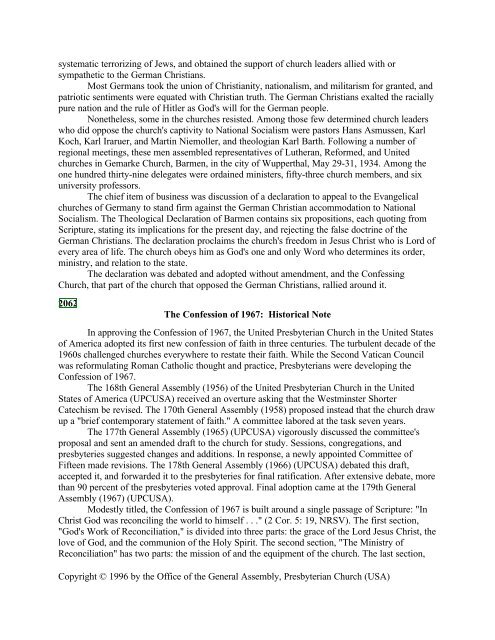The Book of Confessions - The Presbyterian Leader
The Book of Confessions - The Presbyterian Leader
The Book of Confessions - The Presbyterian Leader
Create successful ePaper yourself
Turn your PDF publications into a flip-book with our unique Google optimized e-Paper software.
systematic terrorizing <strong>of</strong> Jews, and obtained the support <strong>of</strong> church leaders allied with or<br />
sympathetic to the German Christians.<br />
Most Germans took the union <strong>of</strong> Christianity, nationalism, and militarism for granted, and<br />
patriotic sentiments were equated with Christian truth. <strong>The</strong> German Christians exalted the racially<br />
pure nation and the rule <strong>of</strong> Hitler as God's will for the German people.<br />
Nonetheless, some in the churches resisted. Among those few determined church leaders<br />
who did oppose the church's captivity to National Socialism were pastors Hans Asmussen, Karl<br />
Koch, Karl Iraruer, and Martin Niemoller, and theologian Karl Barth. Following a number <strong>of</strong><br />
regional meetings, these men assembled representatives <strong>of</strong> Lutheran, Reformed, and United<br />
churches in Gemarke Church, Barmen, in the city <strong>of</strong> Wupperthal, May 29-31, 1934. Among the<br />
one hundred thirty-nine delegates were ordained ministers, fifty-three church members, and six<br />
university pr<strong>of</strong>essors.<br />
<strong>The</strong> chief item <strong>of</strong> business was discussion <strong>of</strong> a declaration to appeal to the Evangelical<br />
churches <strong>of</strong> Germany to stand firm against the German Christian accommodation to National<br />
Socialism. <strong>The</strong> <strong>The</strong>ological Declaration <strong>of</strong> Barmen contains six propositions, each quoting from<br />
Scripture, stating its implications for the present day, and rejecting the false doctrine <strong>of</strong> the<br />
German Christians. <strong>The</strong> declaration proclaims the church's freedom in Jesus Christ who is Lord <strong>of</strong><br />
every area <strong>of</strong> life. <strong>The</strong> church obeys him as God's one and only Word who determines its order,<br />
ministry, and relation to the state.<br />
<strong>The</strong> declaration was debated and adopted without amendment, and the Confessing<br />
Church, that part <strong>of</strong> the church that opposed the German Christians, rallied around it.<br />
2062<br />
<strong>The</strong> Confession <strong>of</strong> 1967: Historical Note<br />
In approving the Confession <strong>of</strong> 1967, the United <strong>Presbyterian</strong> Church in the United States<br />
<strong>of</strong> America adopted its first new confession <strong>of</strong> faith in three centuries. <strong>The</strong> turbulent decade <strong>of</strong> the<br />
1960s challenged churches everywhere to restate their faith. While the Second Vatican Council<br />
was reformulating Roman Catholic thought and practice, <strong>Presbyterian</strong>s were developing the<br />
Confession <strong>of</strong> 1967.<br />
<strong>The</strong> 168th General Assembly (1956) <strong>of</strong> the United <strong>Presbyterian</strong> Church in the United<br />
States <strong>of</strong> America (UPCUSA) received an overture asking that the Westminster Shorter<br />
Catechism be revised. <strong>The</strong> 170th General Assembly (1958) proposed instead that the church draw<br />
up a "brief contemporary statement <strong>of</strong> faith." A committee labored at the task seven years.<br />
<strong>The</strong> 177th General Assembly (1965) (UPCUSA) vigorously discussed the committee's<br />
proposal and sent an amended draft to the church for study. Sessions, congregations, and<br />
presbyteries suggested changes and additions. In response, a newly appointed Committee <strong>of</strong><br />
Fifteen made revisions. <strong>The</strong> 178th General Assembly (1966) (UPCUSA) debated this draft,<br />
accepted it, and forwarded it to the presbyteries for final ratification. After extensive debate, more<br />
than 90 percent <strong>of</strong> the presbyteries voted approval. Final adoption came at the 179th General<br />
Assembly (1967) (UPCUSA).<br />
Modestly titled, the Confession <strong>of</strong> 1967 is built around a single passage <strong>of</strong> Scripture: "In<br />
Christ God was reconciling the world to himself . . ." (2 Cor. 5: 19, NRSV). <strong>The</strong> first section,<br />
"God's Work <strong>of</strong> Reconciliation," is divided into three parts: the grace <strong>of</strong> the Lord Jesus Christ, the<br />
love <strong>of</strong> God, and the communion <strong>of</strong> the Holy Spirit. <strong>The</strong> second section, "<strong>The</strong> Ministry <strong>of</strong><br />
Reconciliation" has two parts: the mission <strong>of</strong> and the equipment <strong>of</strong> the church. <strong>The</strong> last section,<br />
Copyright © 1996 by the Office <strong>of</strong> the General Assembly, <strong>Presbyterian</strong> Church (USA)




